- Home
- Alice Munro
The Love of a Good Woman Page 8
The Love of a Good Woman Read online
Page 8
I am not going to tell, but you are. You can’t live on with that kind of secret.
You cannot live in the world with such a burden. You will not be able to stand your life.
If she had got so far, and he had neither denied what she said nor pushed her into the river, Enid would know that she had won the gamble. It would take some more talking, more absolutely firm but quiet persuasion, to bring him to the point where he would start to row back to shore.
Or, lost, he would say, What will I do? and she would take him one step at a time, saying first, Row back.
The first step in a long, dreadful journey. She would tell him every step and she would stay with him for as many of them as she could. Tie up the boat now. Walk up the bank. Walk through the meadow. Open the gate. She would walk behind him or in front, whichever seemed better to him. Across the yard and up the porch and into the kitchen.
They will say goodbye and get into their separate cars and then it will be his business where he goes. And she will not phone the Police Office the next day. She will wait and they will phone her and she will go to see him in jail. Every day, or as often as they will let her, she will sit and talk to him in jail, and she will write him letters as well. If they take him to another jail she will go there; even if she is allowed to see him only once a month she will be close by. And in court—yes, every day in court, she will be sitting where he can see her.
She does not think anyone would get a death sentence for this sort of murder, which was in a way accidental, and was surely a crime of passion, but the shadow is there, to sober her when she feels that these pictures of devotion, of a bond that is like love but beyond love, are becoming indecent.
Now it has started. With her asking to be taken on the river, her excuse of the picture. Both she and Rupert are standing up, and she is facing the door of the sickroom—now again the front room—which is shut.
She says a foolish thing.
“Are the quilts taken down off the windows?”
He doesn’t seem to know for a minute what she is talking about. Then he says, “The quilts. Yes. I think it was Olive took them down. In there was where we had the funeral.”
“I was only thinking. The sun would fade them.”
He opens the door and she comes around the table and they stand looking into the room. He says, “You can go in if you like. It’s all right. Come in.”
The bed is gone, of course. The furniture is pushed back against the walls. The middle of the room, where they would have set up the chairs for the funeral, is bare. So is the space in between the north windows—that must have been where they put the coffin. The table where Enid was used to setting the basin, and laying out cloths, cotton wool, spoons, medicine, is jammed into a corner and has a bouquet of delphiniums sitting on it. The tall windows still hold plenty of daylight.
“Lies” is the word that Enid can hear now, out of all the words that Mrs. Quinn said in that room. Lies. I bet it’s all lies.
COULD a person make up something so detailed and diabolical? The answer is yes. A sick person’s mind, a dying person’s mind, could fill up with all kinds of trash and organize that trash in a most convincing way. Enid’s own mind, when she was asleep in this room, had filled up with the most disgusting inventions, with filth. Lies of that nature could be waiting around in the corners of a person’s mind, hanging like bats in the corners, waiting to take advantage of any kind of darkness. You can never say, Nobody could make that up. Look how elaborate dreams are, layer over layer in them, so that the part you can remember and put into words is just the bit you can scratch off the top.
When Enid was four or five years old she had told her mother that she had gone into her father’s office and that she had seen him sitting behind his desk with a woman on his knee. All she could remember about this woman, then and now, was that she wore a hat with a great many flowers on it and a veil (a hat quite out of fashion even at that time), and that her blouse or dress was unbuttoned and there was one bare breast sticking out, the tip of it disappearing into Enid’s father’s mouth. She had told her mother about this in perfect certainty that she had seen it. She said, “One of her fronts was stuck in Daddy’s mouth.” She did not know the word for breasts, though she did know they came in pairs.
Her mother said, “Now, Enid. What are you talking about? What on earth is a front?”
“Like an ice-cream cone,” Enid said.
And she saw it that way, exactly. She could see it that way still. The biscuit-colored cone with its mound of vanilla ice cream squashed against the woman’s chest and the wrong end sticking into her father’s mouth.
Her mother then did a very unexpected thing. She undid her own dress and took out a dull-skinned object that flopped over her hand. “Like this?” she said.
Enid said no. “An ice-cream cone,” she said.
“Then that was a dream,” her mother said. “Dreams are sometimes downright silly. Don’t tell Daddy about it. It’s too silly.”
Enid did not believe her mother right away, but in a year or so she saw that such an explanation had to be right, because ice-cream cones did not ever arrange themselves in that way on ladies’ chests and they were never so big. When she was older still she realized that the hat must have come from some picture.
Lies.
SHE hadn’t asked him yet, she hadn’t spoken. Nothing yet committed her to asking. It was still before. Mr. Willens had still driven himself into Jutland Pond, on purpose or by accident. Everybody still believed that, and as far as Rupert was concerned Enid believed it, too. And as long as that was so, this room and this house and her life held a different possibility, an entirely different possibility from the one she had been living with (or glorying in—however you wanted to put it) for the last few days. The different possibility was coming closer to her, and all she needed to do was to keep quiet and let it come. Through her silence, her collaboration in a silence, what benefits could bloom. For others, and for herself.
This was what most people knew. A simple thing that it had taken her so long to understand. This was how to keep the world habitable.
She had started to weep. Not with grief but with an onslaught of relief that she had not known she was looking for. Now she looked into Rupert’s face and saw that his eyes were bloodshot and the skin around them puckered and dried out, as if he had been weeping, too.
He said, “She wasn’t lucky in her life.”
Enid excused herself and went to get her handkerchief, which was in her purse on the table. She was embarrassed now that she had dressed herself up in readiness for such a melodramatic fate.
“I don’t know what I was thinking of,” she said. “I can’t walk down to the river in these shoes.”
Rupert shut the door of the front room.
“If you want to go we can still go,” he said. “There ought to be a pair of rubber boots would fit you somewhere.”
Not hers, Enid hoped. No. Hers would be too small.
Rupert opened a bin in the woodshed, just outside the kitchen door. Enid had never looked into that bin. She had thought it contained firewood, which she had certainly had no need of that summer. Rupert lifted out several single rubber boots and even snow boots, trying to find a pair.
“These look like they might do,” he said. “They maybe were Mother’s. Or even mine before my feet got full size.”
He pulled out something that looked like a piece of a tent, then, by a broken strap, an old school satchel.
“Forgot all the stuff that was in here,” he said, letting these things fall back and throwing the unusable boots on top of them. He dropped the lid and gave a private, grieved, and formal-sounding sigh.
A house like this, lived in by one family for so long a time, and neglected for the past several years, would have plenty of bins, drawers, shelves, suitcases, trunks, crawl spaces full of things that it would be up to Enid to sort out, saving and labelling some, restoring some to use, sending others by the boxload to the dump. When sh
e got that chance she wouldn’t balk at it. She would make this house into a place that had no secrets from her and where all order was as she had decreed.
He set the boots down in front of her while she was bent over unbuckling her shoes. She smelled under the whiskey the bitter breath that came after a sleepless night and a long harsh day; she smelled the deeply sweat-soaked skin of a hardworked man that no washing—at least the washing he did—could get quite fresh. No bodily smell—even the smell of semen—was unfamiliar to her, but there was something new and invasive about the smell of a body so distinctly not in her power or under her care.
That was welcome.
“See can you walk,” he said.
She could walk. She walked in front of him to the gate. He bent over her shoulder to swing it open for her. She waited while he bolted it, then stood aside to let him walk ahead, because he had brought a little hatchet from the woodshed, to clear their path.
“The cows were supposed to keep the growth down,” he said. “But there’s things cows won’t eat.”
She said, “I was only down here once. Early in the morning.”
The desperation of her frame of mind then had to seem childish to her now.
Rupert went along chopping at the big fleshy thistles. The sun cast a level, dusty light on the bulk of the trees ahead. The air was clear in some places, then suddenly you would enter a cloud of tiny bugs. Bugs no bigger than specks of dust that were constantly in motion yet kept themselves together in the shape of a pillar or a cloud. How did they manage to do that? And how did they choose one spot over another to do it in? It must have something to do with feeding. But they never seemed to be still enough to feed.
When she and Rupert went underneath the roof of summer leaves it was dusk, it was almost night. You had to watch that you didn’t trip over roots that swelled up out of the path, or hit your head on the dangling, surprisingly tough-stemmed vines. Then a flash of water came through the black branches. The lit-up water near the opposite bank of the river, the trees over there still decked out in light. On this side—they were going down the bank now, through the willows—the water was tea-colored but clear.
And the boat waiting, riding in the shadows, just the same.
“The oars are hid,” said Rupert. He went into the willows to locate them. In a moment she lost sight of him. She went closer to the water’s edge, where her boots sank into the mud a little and held her. If she tried to, she could still hear Rupert’s movements in the bushes. But if she concentrated on the motion of the boat, a slight and secretive motion, she could feel as if everything for a long way around had gone quiet.
JAKARTA
KATH and Sonje have a place of their own on the beach, behind some large logs. They have chosen this not only for shelter from the occasional sharp wind—they’ve got Kath’s baby with them—but because they want to be out of sight of a group of women who use the beach every day. They call these women the Monicas.
The Monicas have two or three or four children apiece. They are all under the leadership of the real Monica, who walked down the beach and introduced herself when she first spotted Kath and Sonje and the baby. She invited them to join the gang.
They followed her, lugging the carry-cot between them. What else could they do? But since then they lurk behind the logs.
The Monicas’ encampment is made up of beach umbrellas, towels, diaper bags, picnic hampers, inflatable rafts and whales, toys, lotions, extra clothing, sun hats, thermos bottles of coffee, paper cups and plates, and thermos tubs in which they carry homemade fruit-juice Popsicles.
They are either frankly pregnant or look as if they might be pregnant, because they have lost their figures. They trudge down to the water’s edge, hollering out the names of their children who are riding and falling off logs or the inflatable whales.
“Where’s your hat? Where’s your ball? You’ve been on that thing long enough now, let Sandy have a turn.”
Even when they talk to each other their voices have to be raised high, over the shouts and squalls of their children.
“You can get ground round as cheap as hamburger if you go to Woodward’s.”
“I tried zinc ointment but it didn’t work.”
“Now he’s got an abscess in the groin.”
“You can’t use baking powder, you have to use soda.”
These women aren’t so much older than Kath and Sonje. But they’ve reached a stage in life that Kath and Sonje dread. They turn the whole beach into a platform. Their burdens, their strung-out progeny and maternal poundage, their authority, can annihilate the bright water, the perfect small cove with the red-limbed arbutus trees, the cedars, growing crookedly out of the high rocks. Kath feels their threat particularly, since she’s a mother now herself. When she nurses her baby she often reads a book, sometimes smokes a cigarette, so as not to sink into a sludge of animal function. And she’s nursing so that she can shrink her uterus and flatten her stomach, not just provide the baby—Noelle—with precious maternal antibodies.
Kath and Sonje have their own thermos of coffee and their extra towels, with which they’ve rigged up a shelter for Noelle. They have their cigarettes and their books. Sonje has a book by Howard Fast. Her husband has told her that if she has to read fiction that’s who she should be reading. Kath is reading the short stories of Katherine Mansfield and the short stories of D. H. Lawrence. Sonje has got into the habit of putting down her own book and picking up whichever book of Kath’s that Kath is not reading at the moment. She limits herself to one story and then goes back to Howard Fast.
When they get hungry one of them makes the trek up a long flight of wooden steps. Houses ring this cove, up on the rocks under the pine and cedar trees. They are all former summer cottages, from the days before the Lions Gate Bridge was built, when people from Vancouver would come across the water for their vacations. Some cottages—like Kath’s and Sonje’s—are still quite primitive and cheap to rent. Others, like the real Monica’s, are much improved. But nobody intends to stay here; everybody’s planning to move on to a proper house. Except for Sonje and her husband, whose plans seem more mysterious than anybody else’s.
There is an unpaved crescent road serving the houses, and joined at either end to Marine Drive. The enclosed semicircle is full of tall trees and an undergrowth of ferns and salmonberry bushes, and various intersecting paths, by which you can take a shortcut out to the store on Marine Drive. At the store Kath and Sonje will buy takeout French fries for lunch. More often it’s Kath who makes this expedition, because it’s a treat for her to walk under the trees—something she can’t do anymore with the baby carriage.
When she first came here to live, before Noelle was born, she would cut through the trees nearly every day, never thinking of her freedom. One day she met Sonje. They had both worked at the Vancouver Public Library a little while before this, though they had not been in the same department and had never talked to each other. Kath had quit in the sixth month of pregnancy as you were required to do, lest the sight of you should disturb the patrons, and Sonje had quit because of a scandal.
Or, at least, because of a story that had got into the newspapers. Her husband, Cottar, who was a journalist working for a magazine that Kath had never heard of, had made a trip to Red China. He was referred to in the paper as a left-wing writer. Sonje’s picture appeared beside his, along with the information that she worked in the library. There was concern that in her job she might be promoting Communist books and influencing children who used the library, so that they might become Communists. Nobody said that she had done this—just that it was a danger. Nor was it against the law for somebody from Canada to visit China. But it turned out that Cottar and Sonje were both Americans, which made their behavior more alarming, perhaps more purposeful.
“I know that girl,” Kath had said to her husband, Kent, when she saw Sonje’s picture. “At least I know her to see her. She always seems kind of shy. She’ll be embarrassed about this.”
�
��No she won’t,” said Kent. “Those types love to feel persecuted, it’s what they live for.”
The head librarian was reported as saying that Sonje had nothing to do with choosing books or influencing young people—she spent most of her time typing out lists.
“Which was funny,” Sonje said to Kath, after they had recognized each other, and spoken and spent about half an hour talking on the path. The funny thing was that she did not know how to type.
She wasn’t fired, but she had quit anyway. She thought she might as well, because she and Cottar had some changes coming up in their future.
Kath wondered if one change might be a baby. It seemed to her that life went on, after you finished school, as a series of further examinations to be passed. The first one was getting married. If you hadn’t done that by the time you were twenty-five, that examination had to all intents and purposes been failed. (She always signed her name “Mrs. Kent Mayberry” with a sense of relief and mild elation.) Then you thought about having the first baby. Waiting a year before you got pregnant was a good idea. Waiting two years was a little more prudent than necessary. And three years started people wondering. Then down the road somewhere was the second baby. After that the progression got dimmer and it was hard to be sure just when you had arrived at wherever it was you were going.
Sonje was not the sort of friend who would tell you that she was trying to have a baby and how long she’d been trying and what techniques she was using. She never talked about sex in that way, or about her periods or any behavior of her body—though she soon told Kath things that most people would consider much more shocking. She had a graceful dignity—she had wanted to be a ballet dancer until she got too tall, and she didn’t stop regretting that until she met Cottar, who said, “Oh, another little bourgeois girl hoping she’ll turn into a dying swan.” Her face was broad, calm, pink skinned—she never wore any makeup, Cottar was against makeup—and her thick fair hair was pinned up in a bushy chignon. Kath thought she was wonderful looking—both seraphic and intelligent.

 Runaway
Runaway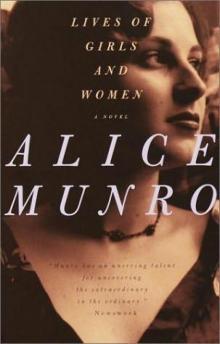 Lives of Girls and Women
Lives of Girls and Women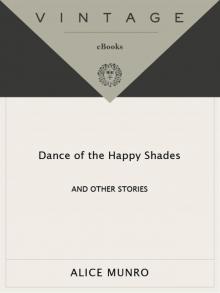 Dance of the Happy Shades
Dance of the Happy Shades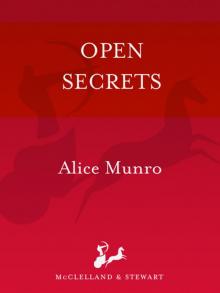 Open Secrets
Open Secrets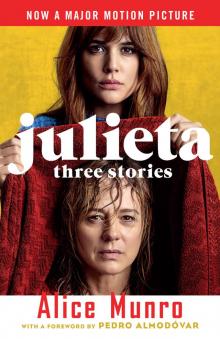 Julieta (Movie Tie-in Edition)
Julieta (Movie Tie-in Edition)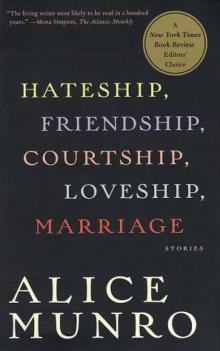 Hateship, Friendship, Courtship, Loveship, Marriage: Stories
Hateship, Friendship, Courtship, Loveship, Marriage: Stories Alice Munro's Best
Alice Munro's Best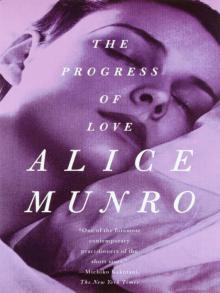 The Progress of Love
The Progress of Love Selected Stories
Selected Stories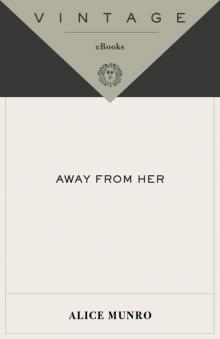 Away from Her
Away from Her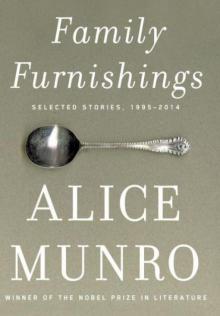 Family Furnishings
Family Furnishings Moons of Jupiter
Moons of Jupiter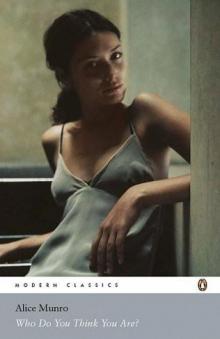 Who Do You Think You Are?
Who Do You Think You Are?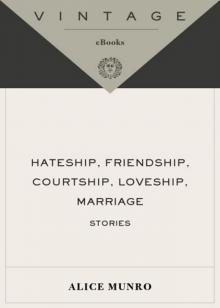 Hateship, Friendship, Courtship, Loveship, Marriage
Hateship, Friendship, Courtship, Loveship, Marriage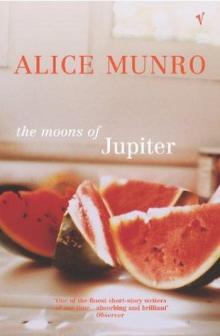 The Moons of Jupiter
The Moons of Jupiter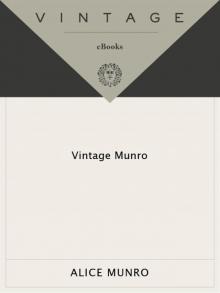 Vintage Munro
Vintage Munro The Love of a Good Woman
The Love of a Good Woman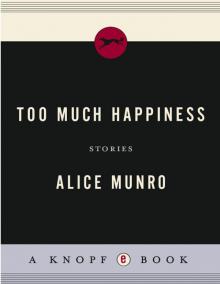 Too Much Happiness
Too Much Happiness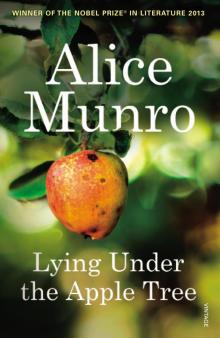 Lying Under the Apple Tree
Lying Under the Apple Tree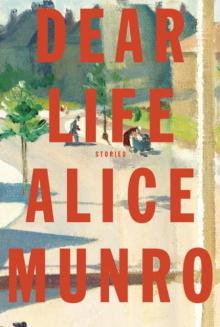 Dear Life
Dear Life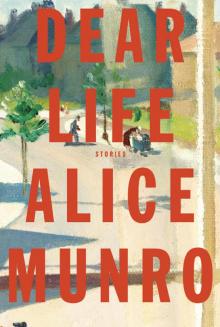 Dear Life: Stories
Dear Life: Stories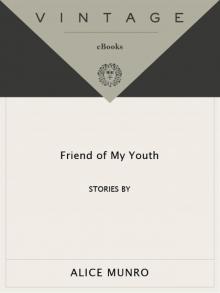 Friend of My Youth
Friend of My Youth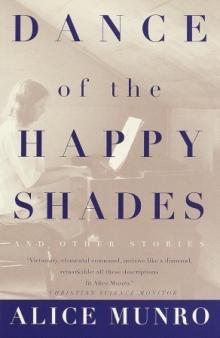 Dance of the Happy Shades: And Other Stories
Dance of the Happy Shades: And Other Stories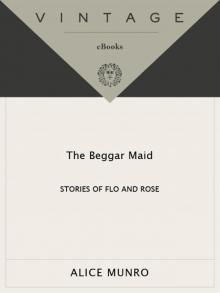 The Beggar Maid
The Beggar Maid